Article URL: https://jobs.ashbyhq.com/fathom.video/50323c12-96b2-4e6a-b8ea-98f21ea6e960 Comments URL: https://news.ycombinator.com/item?id=40181522 Points: 0 # Comments: 0 The post Fathom AI Notetaker (YC W21) is hiring a Back end Engineer (remote) appeared first on #1 seo FOR SMALL BUSINESSES. The post Fathom AI Notetaker (YC W21) is hiring a Back end Engineer (remote) appeared first on Buy It At A Bargain … Continue reading Fathom AI Notetaker (YC W21) is hiring a Back end Engineer (remote)
Author: Malcom Wojcik
Cambly (YC W14) is hiring engineers in SF to help people learn and teach English
Article URL: https://jobs.ashbyhq.com/Cambly?departmentId=58bf36fe-813a-4048-bd36-11bd6f0ee3e2&utm_source=ROe4eDx4yP
Comments URL: https://news.ycombinator.com/item?id=40107283
Points: 0
# Comments: 0
Boston police identify suspect accused of shooting responding police officer: ‘No respect for life’
Boston police have identified the suspect who allegedly shot a Boston Police officer multiple times Friday night.
John Lazare, 23, of Brockton, Massachusetts is facing a slew of charges including assault and battery with a firearm, armed robbery, and assault with a dangerous weapon, Boston Police officials said in a press conference on Saturday, June 10.
“This is another example of people who have no respect for life in any way shape or form,” Police Commissioner Michael Cox said at the press conference.
According to the police report, on Friday, June 9 at approximately 9:15 p.m., the unidentified officer saw Lazare who was in the process of robbing a delivery driver.
4 SHOT, INJURED DURING ALLEGED ‘TARGETED’ FUNERAL PROCESSION IN SURBURAN CHICAGO
The officer said that Lazare matched the description of someone wanted for robbing a Domino’s Pizza delivery driver on the same street on Wednesday.
When the officer went to confront him, Lazare allegedly opened fire, hitting the officer multiple times.
Police say that Lazare attempted to evade arrest by running inside a store and climbing onto the roof of a building. He allegedly jumped from the roof, landing in an alleyway and injuring his leg.
The Boston police department officer called for assistance over a police channel, and colleagues came and arrested Lazare and took the injured officer to Boston Medical Center. The officer was treated for non-life-threatening gunshot wounds.
Boston Police Commissioner Michael Cox said Saturday that the officer is expected to survive. His name has not been released.
Massachusetts State Police Superintendent Colonel Jack Mawn released a statement following the officer shooting, commending the officer and sharing his commitment to keep people in Massachusetts safe.
“When they hurt, we hurt,” Mawn said in a statement. “Policing is a dangerous job. The men and women in this profession wear a bulletproof vest and carry a pistol, just to go to work.”
“It is a noble profession – a calling, more than an occupation,” he continued. “Those who answer the call, who join the ranks, know the risks. There are times, like last night, when we are confronted with this reality.”
FLORIDA MAN ARRESTED NEARLY FOUR DECADES FOLLOWING COLD CASE MURDER IN CALIFORNIA
Mawn said that since May 31, 2023, 166 officers have been shot in the line of duty in the U.S., and 20 of them died.
CLICK HERE TO GET THE FOX NEWS APP
“To members of the law enforcement profession, we thank you from the depth of our hearts,” Mawn said. “Please continue to take care of yourselves, each other, and those who wait for your safe return home at the end of every shift.”
Bitmovin (YC S15) is hiring a senior customer success manager in the US
Article URL: https://bitmovin.com/careers/6626296002/
Comments URL: https://news.ycombinator.com/item?id=35142523
Points: 1
# Comments: 0
Pachyderm (YC W15) is hiring sales engineers and solutions architects
Article URL: https://boards.greenhouse.io/pachyderm/jobs/5237764003
Comments URL: https://news.ycombinator.com/item?id=33183069
Points: 1
# Comments: 0
SEO vs PPC: Pros, Cons, & Everything In Between
“Which is better, SEO vs PPC?”
If there’s one question I get asked more than any other, this is it.
Everyone wants to know who wins in the battle and where they should spend their marketing dollars. And everyone hates when I tell them there isn’t an easy answer.
Like everything else, it depends.
Neither SEO nor PPC is fundamentally better than the other. As you’ll discover in this article, each tactic has its own set of advantages and disadvantages.
What is almost always true is that SEO and PPC work better together. Don’t believe me? I’ll prove it. In this article, I will:
- Guide you through the positives and negatives of both digital marketing strategies
- Show how each of them supports your business
- Show you how PPC and SEO work together
Ready? Then let’s look at my favorite digital marketing strategy first.
How SEO Supports Your Business
If you need a search engine optimization primer, read my guide to SEO before going any further. If you don’t, you should already have a pretty solid understanding of how ranking on a search engine’s result pages can generate awesome traffic that grows your business.
Almost any business can benefit from the free traffic that search engines like Google send their way, but that’s not to say SEO should definitely be the be-all-end-all when it comes to marketing strategies. As you’ll read below, while there are plenty of benefits of SEO, there are also a couple of drawbacks to be aware of.
Pros of SEO
It’s cost-effective. SEO can be one of the cheapest forms of marketing and an incredibly cost-effective way of growing your brand. You don’t have to pay to receive organic traffic, and you can do much of the work yourself. But even using an SEO agency is much more cost-effective than PPC.
It delivers long-term results. If you do SEO correctly, your efforts can pay dividends for years to come. Not only will you avoid Google penalties, but SEO also has a habit of compounding. The top pages get more backlinks by virtue of being the top-ranked pages on Google. In turn, that makes them even more likely to continue ranking high in the future.
It targets every part of your funnel. Consumers are using Google at every stage of the buyer’s journey. That makes SEO one of the few digital marketing strategies to target every part of the sales funnel. Use SEO to engage customers early in their journey, and you should be able to significantly decrease acquisition costs.
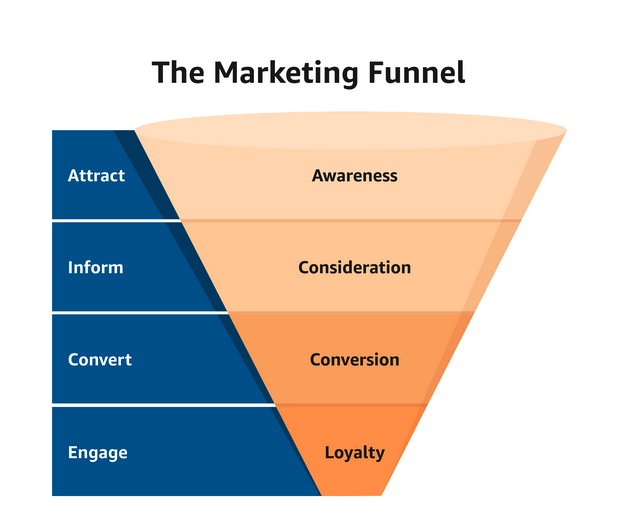
Great brand awareness and trust. The more you appear on Google, the more consumers will trust your brand. And unlike PPC, you don’t have to spend a fortune to dominate the search results. With a focus on content marketing, you can become the go-to resource for your industry, appearing for every relevant keyword and positioning your brand as the trusted authority.
Cons of SEO
It takes time. Your SEO efforts aren’t going to drive instant results. It can take between six months and a year to see significant traction. As you can see from the graph below from content marketing agency Grow & Convert, there is a direct correlation between the length of engagement and the number of first-page rankings. Results can occur faster, but SEO may not be your best bet if you need to drive traffic now. That doesn’t mean you should avoid it, however. The sooner you start with SEO, the quicker you’ll see the kind of long-term results I described above.
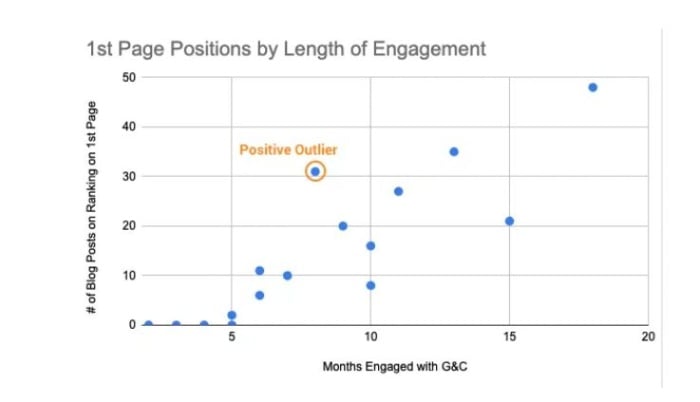
You need to keep investing. While you can stop all SEO efforts and continue to see excellent results, I wouldn’t recommend it. In order to keep competing with the top brands, you’ll need to continue to publish new content, update existing articles and stay on top of the latest advice from Google.
You must be precise. You can’t half-heartedly work on SEO. Because Google and other search engines are constantly updating their algorithms and penalizing sites that use black and gray hat optimization techniques, you need to do SEO the right way. Trying to cheat the system and get quick wins will only see you end up with a penalty. And once you get penalized by Google, it’s far from easy to recover.
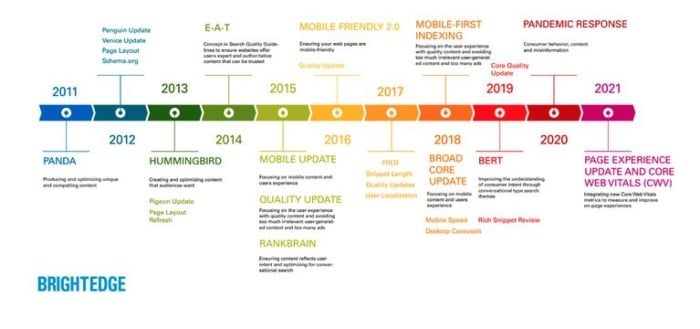
It requires a high level of skill. While anyone can do the work of an SEO in theory, being successful is another thing entirely. Not only is there a lot to know because of the complex nature of Google’s algorithm, but the work can be incredibly time-consuming. So even if you follow my advice, you may not necessarily have the resources to create content, optimize your on-page elements and build links. That’s why most people will look to hire an SEO consultant or an SEO agency, instead of doing the work themselves.
How PPC Supports Your Businesses
PPC stands for Pay Per Click Marketing. It is the practice of using paid advertising on search engines like Google and Bing to drive targeted traffic to your website. If you need more information on the basics of PPC, check out my overview of PPC before reading on.
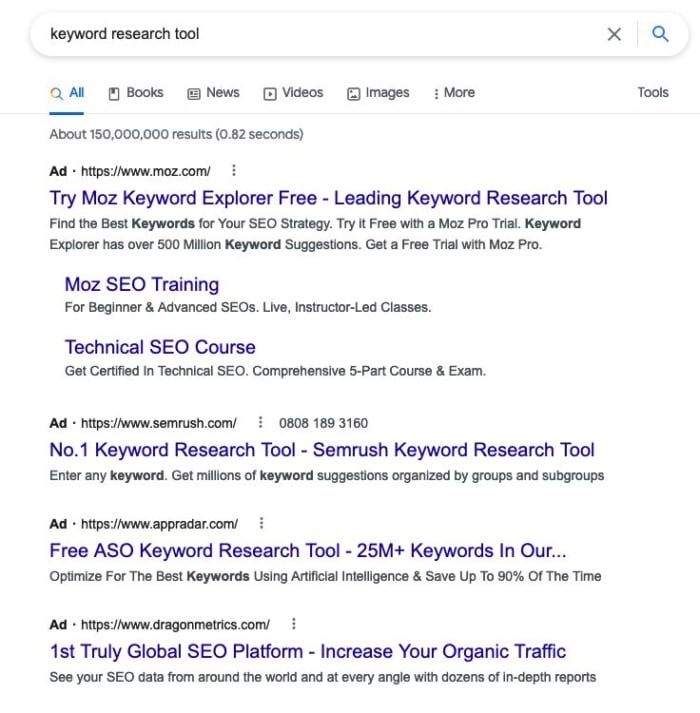
As you can see from the screenshot above, PPC gives you the opportunity to appear at the very top of search engines. I’ll show you below just how powerful that can be. But don’t think that kind of placement comes for free. Among the biggest cons of PPC is the price you have to pay.
Let’s dig into those pros and cons further.
Pros of PPC
It delivers instant results. PPC is possibly the only digital marketing strategy where you can see results the same day you launch a campaign. The same certainly can’t be said for SEO. Of course, you’ll need to pay a lot to achieve fast results, and you’ll still need to create a great landing page, but it’s certainly possible to see a return on your investment within a week. You can scale results quickly, too. If your ads and landing pages convert, then acquiring more visitors is usually just a case of spending more money on ads.
It offers exceptional visibility. PPC ads are the first thing users see on desktop and mobile searches. Better yet, Google now makes it far less obvious that the top results are paid ads. In some cases, there can be as many as four paid ad spots before the organic results, as well as shopping ads. PPC ads also let you highlight key business information like your phone number and site links in a way that SEO doesn’t.
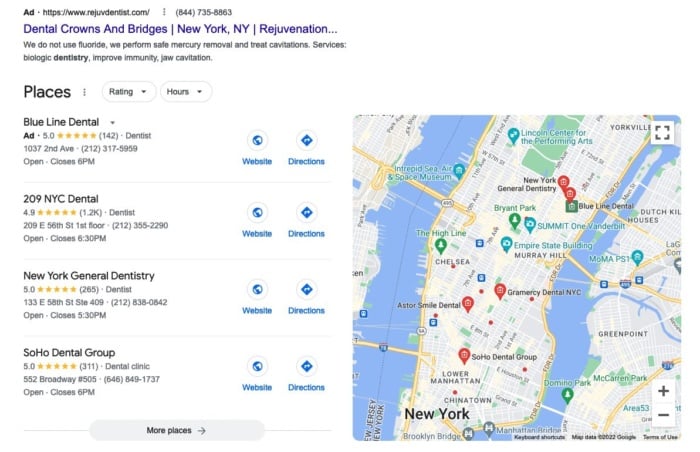
You get high-intent clicks. Most of the users clicking on your PPC ads will be close to making a purchase. That’s because most PPC ads only target high-intent commercial keywords. As a result, conversation rates are much higher for PPC than SEO. It also means it’s much easier to track to what extent PPC ads drive revenue.
Great data. You will generate a serious amount of data when you run a PPC campaign. You’ll see which ads work, which keywords drive the most traffic, and which landing pages convert best. That makes it easy to optimize your campaigns to increase return on ad spend while decreasing costs. It will also give you data you can use to improve your SEO and other digital marketing campaigns.
Cons of PPC
You have to pay to play. Unlike SEO, which can drive traffic for little to no money, you will need to have a pretty significant marketing budget to see results with PPC marketing. When we talk about industry-specific cost-per-click, it gets even higher, especially when talking about the legal and medical worlds. That’s fine as long as your ads are good, your landing pages convert, and you see a return on your ad spend. But that’s not always the case. Often, you can blow through hundreds or even thousands of dollars before achieving a positive ROI. As you can see, PPC cost per clicks can get pretty expensive.
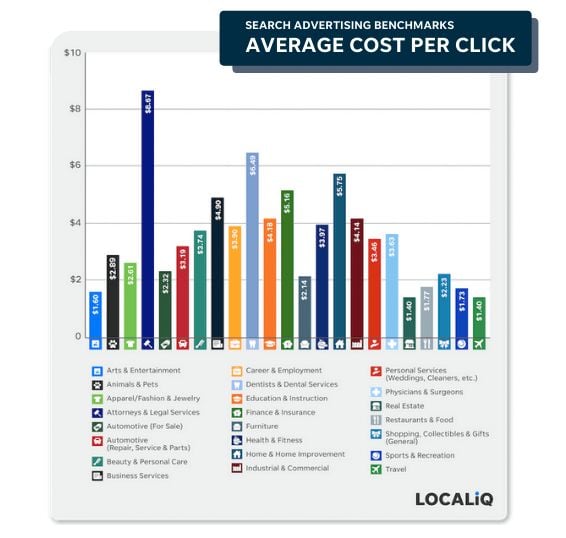
Constant investment is required. Not only do you need to pay to play, but you also need to keep spending money to drive results. Your traffic and sales stop the moment you turn ads off. That makes it all too easy to become reliant on PPC. It is essential to balance your efforts with SEO and other digital marketing strategies.
There’s a learning curve. While it may seem easy to create an ad and put together a budget, optimizing your PPC campaign takes a lot of skill and knowledge. For one, Google and Bing’s platforms can be tricky for beginner marketers to get their heads around. But you also need to understand how optimizing your bids works, what negative keywords to add, and how to best optimize your landing page. None of these things are simple without the help of a PPC agency.
PPC ads can get stale. You need to constantly refresh your ads to keep them engaging. Any form of paid advertising, PPC or otherwise, can suffer when users become ad-blind. That’s when users notice they are reading an ad and scroll past it without engaging. That means PPC campaigns require more than just an ongoing budget. You need to commit to testing out new ads and landing pages if you want to continue driving sales.
SEO and PPC: How They Work Together
In reality, you shouldn’t be choosing between SEO and PPC. You should do both. PPC is great for achieving quick wins and driving high-intent traffic. SEO is a long-term game, but it should be a much more effective strategy after a year or two. You can rank for dozens of keywords with a single article, unlike PPC, where you can only target one.
What’s more, SEO and PPC are even more effective when you combine them together. Just check out the three strategies below for proof.
Crowd the SERPs on Branded Searches
You always want to appear at the top of the SERPs for your branded terms, right? Unfortunately, this isn’t always possible without combining SEO and PPC. Because companies will often create paid ads for their competitors’ branded keywords, you need to be creating PPC ads for your brand terms, too.
In doing so, you’ll own the first page for your terms and significantly boost brand awareness.
Don’t worry; you won’t have to spend a fortune on these ads. Because your landing page will be highly relevant to the search term, the cost of your ad appearing in the first paid ad position will be significantly less than what it will cost your competitors.
Move Expensive PPC Keywords to SEO
Run a PPC campaign for long enough, and you’ll soon find one or more expensive PPC ads that get a reasonable amount of clicks but almost no conversions. These keywords are a colossal waste of money.
This usually happens when these keywords lack commercial intent or target users at the start of the buyer’s journey.
That doesn’t mean it’s a bad keyword, though. Instead of giving up on it completely, use SEO to target it with an article instead. In doing so, you can introduce your brand to consumers earlier in the buyer’s journey and get the chance to grab their email address with a lead magnet. And because the data shows users click on your ad, you know they will probably click on an organic search result with the same angle, too.
Match Organic Results With PPC Ads
One final way to integrate SEO and PPC is to match your PPC ads to the SEO results. When you start doing both SEO and PPC, you’ll notice that a lot of the time, PPC ads don’t align with organic results.
This is particularly common on non-transactional comparison queries that occur in the middle of the buyer’s journey. Customers aren’t looking to buy at this point. They are looking for the best solution.
While the organic search results are filled with comparison posts, many PPC ads will only focus on one product. Search for “best CRM” and you’ll see a great example of this. The ads are all focused on single products, but the top organic result is a comparison post.
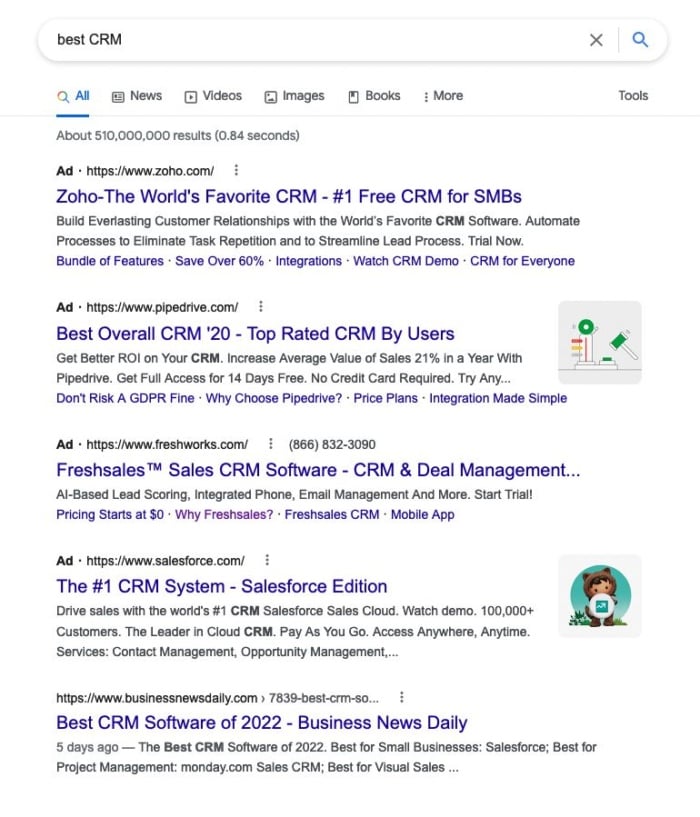
Here’s how you can win big in these cases. Rather than match your PPC ads to existing ads, match your ad to the searcher’s intent.
Instead of creating an ad solely focused on your product, create an ad and landing page that compares the best products in your industry. In doing so, users will be much more likely to click on your ad.
SEO vs PPC Frequently Asked Questions
PPC ads appear at the top of search engines ahead of SEO results. Paid ads are ranked depending on relevance, budget, and landing page quality. SEO results are ranked on over 200 factors.
You can use PPC ads to discover untapped and valuable keywords. PPC also supports your SEO efforts and helps you own the first page of results.
Neither PPC nor SEO is better than the other. They each have their own advantages and disadvantages. That being said, they always work best when used together.
The biggest difference between SEO and PPC is the cost. Traffic from SEO is free, while you need to pay to have a PPC ad appear in search engines.
SEO vs PPC Conclusion
You can use both SEO and PPC to grow your business. SEO will take time, but it is an incredibly cost-effective strategy in the long run. PPC will give you the customers you need now, even if you have to pay for the results.
That’s why I always recommend marketers don’t choose between them. Do both, and make sure you are using both strategies together to drive even more conversions.
Get started with SEO and PPC today by diving into keyword research before creating your first PPC campaign and an SEO strategy.
Which marketing strategy are you most excited about? Do you prioritize one over the other?
Local SEO Keyword Research (Step-by-Step Guide)
Have you heard the line ‘ if you build it, they will come’? In case you don’t know, it’s from the late 80s Kevin Costner movie ‘Field of Dreams.’
It’s an inspiring quote, but when local business owners set up their websites, it doesn’t really hold true. They believe once they’re set up online, prospects start flocking to their doors wanting quotes, making orders, or signing up for their mailing lists. However, that isn’t the case for many people.
That’s not just conjecture on my part. Research shows that 77.23 percent of local business owners surveyed struggled to get online visibility.
According to the same survey, 42.85 percent believe that Google favors larger brands. Now, don’t get me wrong. High-profile businesses do tend to perform better online simply because more people are looking for them. However, that doesn’t mean your local company website can’t compete for local keywords.
All it takes is some careful local keyword research and a detailed local SEO strategy, and that’s exactly what I’m going to talk about today.
Why Is Local SEO Important?
Local SEO is valuable because it helps small companies reach potential customers who are looking for products or services in their area.
For example, if you own a home repair business, you would want to target people in your local area who may need your services. In other words, local keyword research targets potential customers who are already interested in what you have to offer.
When done correctly, local keyword research:
- Generates more leads and sales.
- Helps you rank higher in local search results, increasing website traffic.
- Makes it easier for searchers to find you when they’re searching for local businesses on their mobile devices.
- Builds trust and credibility with potential customers through reviews.
Research also supports the importance of local SEO. According to Statista, 35 percent of consumers go online multiple times weekly to find local businesses.
That’s not all, though. The research shows that 21 percent of consumers use the internet daily to find local businesses.
These stats demonstrate that as a local business, you need to be visible online, but perhaps you need some more evidence? Okay, here goes.
There are plenty of case studies showing how small businesses can benefit from local keyword research and SEO optimization. Just search for ‘local SEO case studies’, and you can see what I mean.
What Makes Local Keyword Research Unique
As I’ve already detailed, the main focus of local SEO and local keyword research is attracting more leads and gaining more customers.
However, aside from using local SEO to target a particular geographic area, there’s plenty more that makes local SEO different.
The most obvious is Google’s ranking factors. With local searches, the search engine giant considers several vital areas, such as:
- The searcher’s location
- The sentiment and keywords in online reviews
- Name, address, and phone number quotations
- A Google My Business profile and relevant keywords
- Your Google Maps star rating
- Social media interest
To improve your local SEO further, Google offers these tips:
- Verify your location, to help improve visibility in local search.
- Keep your opening hours up to date, especially around holiday times. This lets local consumers know you’re open, so they don’t have a wasted visit.
- Manage/respond to reviews, to show you appreciate and act on feedback. Review management is also essential as positive reviews inspire consumer confidence, and can enhance business visibility.
- Add photos and in-store listings. Images showcase your store and products, to give customers a deeper understanding of what you’re selling and whether the products are right for them.
Google also considers relevance, distance, and prominence (your overall web presence), including content, backlinks, and directory listings.
Another factor that makes local keyword research unique is the emphasis on modifiers. The search terms you integrate into writing must be super specific to your location. For example, if you’re a business in Austin, Texas, you would want to use keywords like ‘Austin restaurants’ rather than just ‘restaurants.’
Additionally, voice search is essential to local SEO. Research shows that 74 percent of people use voice search at least weekly to find local businesses, while 76 percent of voice search users choose smart speakers at least once a week, with most searching daily.
A further survey from SEMrush suggests optimizing voice search for each smart speaker (Alexa, Siri, Google Assistant, etc.) and has some helpful tips to enable you to do this:

The above graphic also includes some useful tips you can introduce into your local keyword research strategy.
How To Find The Best Local Keywords
You know the importance of local keyword research, but how do you discover the best ones to use? Fortunately, it’s not as complicated as it may seem. Just follow these tips.
Find Industry-Related Local Keywords
To do this, first, consider what you offer and what services or products you want to promote; then brainstorm a list of keywords related to your business.
Alternatively, a simple way to find local-based keywords is using Google search results. Type in your main keyword and scroll down to the bottom of the page. There, you’ll see a section called ‘related searches.’ For example, a small business located in Miami could target the keyword ‘Miami dentist.’
Then:
- Once you have a list of keywords, do online research to see how popular they are. You can use tools like Ubersuggest, Google Keyword Planner, or Google Trends to get this information. You could also use tools like Ubersuggest to analyze competitor keywords and see if it’s feasible to overtake them in the rankings.
- Another way is to type a keyword into the Google search bar and watch as the autocomplete suggestions appear, giving you some great ideas for related local keywords.
Use Keyword Modifiers
Using keyword modifiers lets you focus your efforts on specific areas or types of searches for targeted traffic and better results from your local SEO efforts.
These modifiers can include location-based terms like ‘near me,’ ‘in my area,’ or ‘local.’ Or you might use ‘car mechanic Cincinnati’ or ‘local mechanic Cincinnati.’
Again, use Autosuggest, related search, or competitive keyword research to see the terms others are using.
Consider Keyword Intent
What are your prospects looking for? Are they looking to buy a product or service, find out more information, or just browsing? Once you know the searcher’s intent, you can better target your keywords and content to meet their needs. Use the same techniques, like Autosuggest, to get an idea of the keywords users are typing in.
Google Places Search Bar
Another great tool for finding local keywords is the Google Places search bar.

When you do a geographical search by entering a location in the search bar, you get a ‘pick list,’ which includes places and likely search terms.
Once you have a list of keywords, it’s essential to analyze them and determine which ones are the best fit for your business.
Implicit Vs. Explicit Local Keywords
When doing local keyword research, there are two main ways to target your audience: implicit and explicit.
Implicit targeting is when a user searches for a term like ‘hardware store’ or ‘DIY.’ but doesn’t include specifics like location.
In simple terms, Google basically guesses what you’re looking for and offers your location-based results.
To find out what implicit local keywords might be important to your business, do some research online and talk to your customers. Ask them how they would search for a company like yours if they were looking for one in their area.
On the other hand, explicit local keyword targeting involves search terms that people use when looking for your product or service. For example, ‘Dentist in Santa Barbara’ or ‘Hairdresser in Venice Beach.’
How To Use Your Competition In Your Local Keyword Research
Can you really steal your competitors’ keywords? Absolutely! Just use a tool to conduct competitive research to find out what keywords they’re using.
There are a few ways to assess and use your competition in your local keyword research:
1. Look at the keywords they are targeting and see if there are any that you’re also targeting. Chances are, if your competitors are targeting a keyword, it’s because it’s profitable and has a lot of search volume.
2. See what their website looks like and how they rank for their target keywords. This can give you ideas on how to improve your website and rank higher for your target keywords. For less competition, you could take the opposite approach and target keywords your rivals aren’t using. Just make sure they’ve got a worthwhile search volume.
3. Review what content they are creating around their target keywords.
4. Look at the SERPs and pay attention to keywords. These terms are usually in bold.
Now let’s look at some tools to make your local keyword research easier.
The Best Local SEO Keyword Research Tools
I’ve already referenced my tool. Ubersuggest, but it’s worthy of another mention here. It’s an easy-to-use tool that delivers:
- Keyword and content ideas
- Keywords by traffic
- Similar websites
- And plenty more besides
For example, if I search for ‘digital marketing agencies California,’ I get:

You can also choose from ‘prepositions,’ ‘related,’ ‘comparisons,’ and ‘questions,’ to get a better idea of search intent.
Other tools to consider:
- Google Keyword Planner. With this tool, you can see competitive keywords and get ideas for other related keywords.
- Moz Local to get a free listing score and see where you stand.
- SERPStat to help you further analyze your competition and for SEO purposes.
Ultimately, the best way to find the right keywords for your business is to experiment with different tools and techniques and analyze what works for you.
FAQs
Local keyword research aims to identify relevant keywords that people are likely to use when searching for businesses like yours online.
Using the right tools is essential. After all, if potential customers can’t find you in your area, you’re missing out on a lot of business. Ubersuggest, Google Keyword Planner, and Moz’s Keyword Planner all get you off to a great start. Then there’s competitive analysis, viewing the SERPs to see what’s ranking, and using autocomplete.
When it comes to doing local keyword research, there are a few things you need to keep in mind. Consider what your customers might search for when they want to find your business and brainstorm. Then, conduct local keyword research with tools like Ubersuggest, Google’s Autosuggest, or People Also Ask. You can also view the SERPs and look for keywords.
Conclusion
Local keyword research should be an essential part of any small business marketing plan.
By understanding the keywords people in your area are searching for, you can create content and advertising that speaks to them directly, and by using the right tools like Ubersuggest, it’s easy to find out what those keywords are.
Search intent is also a vital part of online visibility, so don’t overlook that area if you want local customers to discover you online.
Do you use local keyword research? Share how you got your business on the map below.
New comment by palebt in "Ask HN: Freelancer? Seeking freelancer? (September 2022)"
SEEKING WORK | REMOTE | Worldwide availability
We are not a traditional agency. We do not have clients; we have partners. Get in touch if you want high-quality software for your enterprise.
Our technologies include: Swift (iOS), Kotlin (Android), Dart, Java, Python (Django), Docker
We can build end-to-end custom software for your enterprise and take care of the deployment and maintenance.
Contact: info {at} paleblueapps.com
Website: https://www.paleblueapps.com
New comment by LAC-Tech in "Ask HN: Freelancer? Seeking freelancer? (August 2022)"
SEEKING WORK | Pacific Time to Australia Eastern | REMOTE ONLY The big app rewrite could be the biggest mistake your company ever makes. Imagine writing a new app for years – while still maintaining the old one – only to discover your new system was not fit for purpose and now you have to … Continue reading New comment by LAC-Tech in "Ask HN: Freelancer? Seeking freelancer? (August 2022)"
New comment by etircopyh in "Ask HN: Who wants to be hired? (May 2022)"
Location: Ukraine
Remote: Yes
Willing to relocate: No
Technologies: Linux, Bash/Shell Scripting, Ansible, Terraform, Nginx, Docker, Python, C/C++, SQL, Git
Résumé/CV: https://docs.google.com/document/d/1B98HhTju7Cgyj8s8oXKC7VNm…
LinkedIn: https://www.linkedin.com/in/ivan-tsaruk
Email: etircopyhdot at gmail.com
Linux (7+ years) user and contributor.



